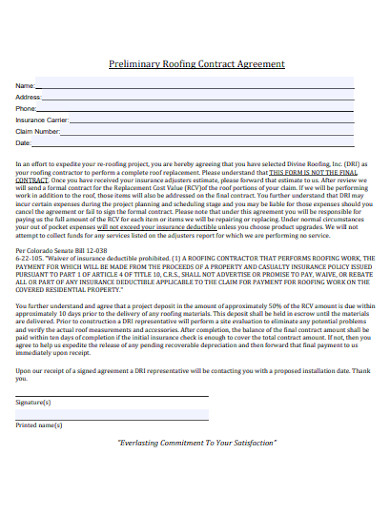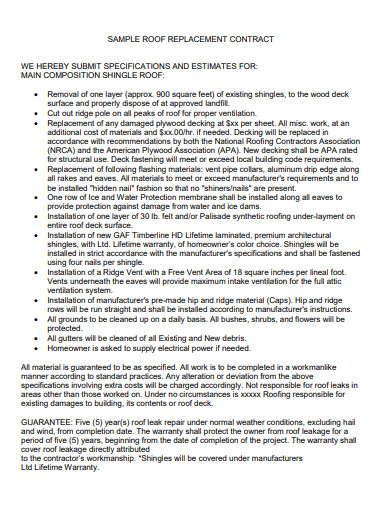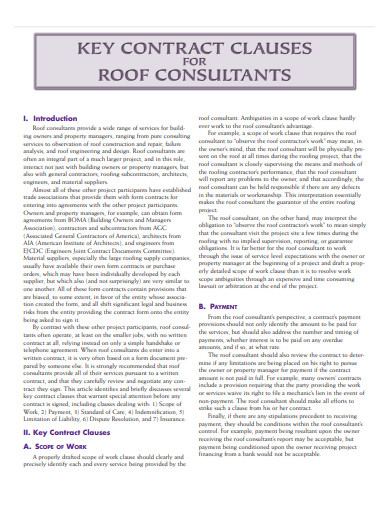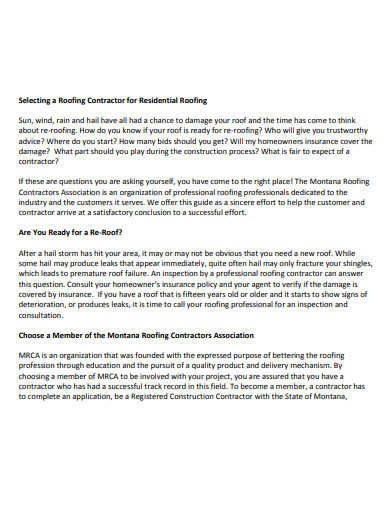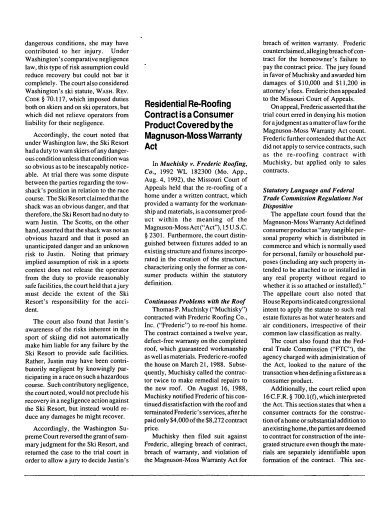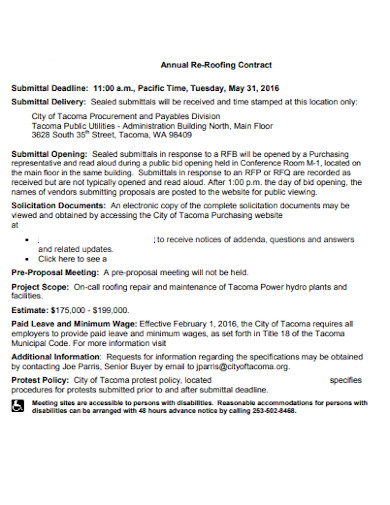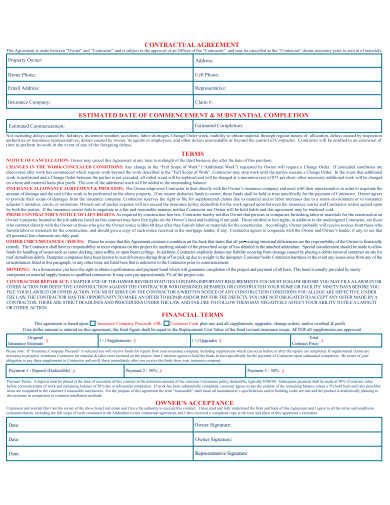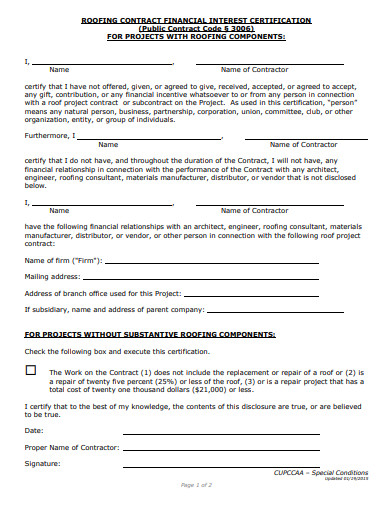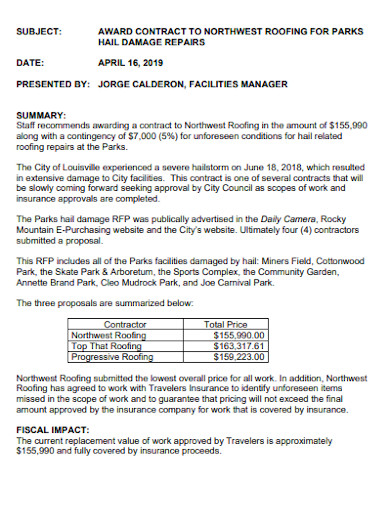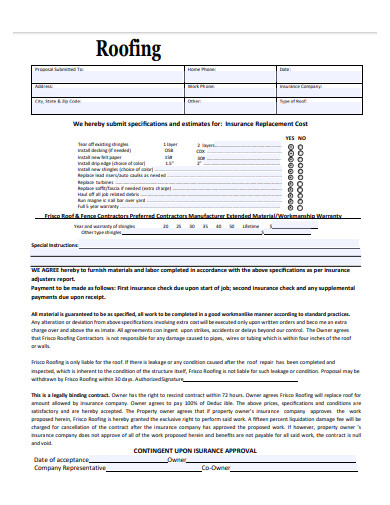14+ Roofing Contract Examples
“The roof is on fire!” We certainly hope that this would not be the phrase your roofing company will be hearing when clients call for your services. But if that will be the case, then you better get a contract signed and fix that roof immediately. When you become a residential roofing or commercial roofing contractor, it is obvious that you have to produce, agree, and sign on a legal written document, which we know as a residential roofing contract or commercial roofing contract. Inside it lies the numerous standard-based specifications of an enforceable agreement regarding the services, such as roof replacement, roof repair, and maintenance. Discussions on payments are included, as well. Learn more by taking a look at our Free 14+ Roofing Contract Examples in various file formats!
14+ Roofing Contract Examples
1. Roofing Contract Template
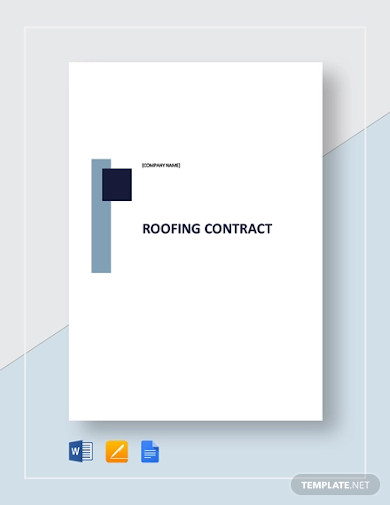
2. Roofing Contract Proposal
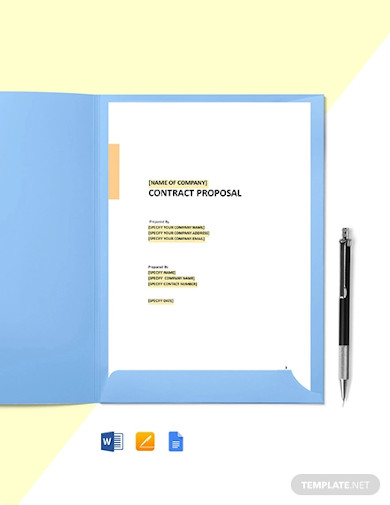
3. Residential Roofing Contract
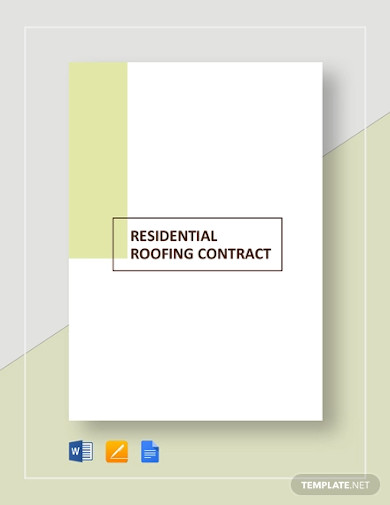
4. Commercial Roofing Contract
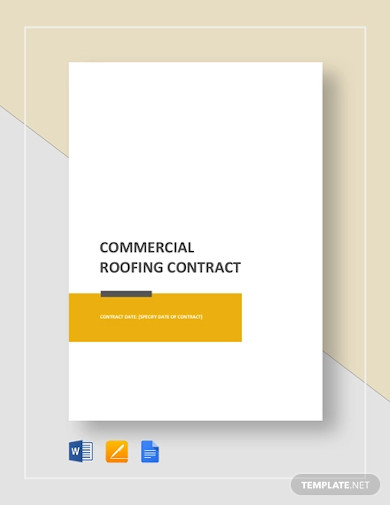
5. Roofing Contractor Estimate
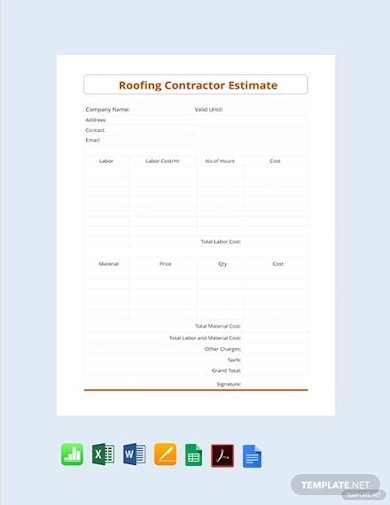
6. Roofing Contract Agreement
7. Roof Replacement Contract
8. Sample Roof Contract
9. Construction Roofing Contract
10. Residential Re-Roofing Contract
11. Annual Re-Roofing Contract
12. Sample Roofing Contract Agreement
13. Financial Roofing Contract
14. Roofing Contract Letter
15. Printable Roofing Contract
What Is a Roofing Contract?
A roofing contract is a document that legally binds a roofing company to provide a certain service to a specific consumer in exchange for money. In Rocket Lawyer’s breakdown of contracts, subject, consideration, and competency came to play. A roofing contract must contain a specific subject. This means that you have to narrow down the definition of the roofing services you and the client have agreed to be done.
The second factor, consideration, is required to be included to make sure that the purpose of your sample contract is valid enough for both parties. In a roofing contract’s case, the business transaction, itself, is already a viable reason to be indulged in by the participants. The last factor’s importance is highly palpable. Without the competency of one party, a roofing contract cannot be made. To be considered competent, the participants must meet the requirements regarding the age and mental state.
All About Contract Risks
Careful companies follow a certain process to successfully obtain and complete a certain contract. They start with a market evaluation, opportunity qualification, bidding, and negotiation. If the contractor passes all of them, they proceed to contract execution then disposal. But no matter how careful they are, contract risks are always there, and they evolve as the contracting process progresses.
There are four identified contract risks. These include creation risk, terms risk, execution risk, and financial risk. Creation risk often occurs in the negotiation phase. Improper initiation, poor communication management plan, and inaccurate signatures are the things that come with it. Terms risk also takes place in the negotiation phase, and it usually happens when outdated stipulations exist and are signed. With the signatures already imprinted, businesses or clients have to carry out the unfavorable conditions until the contract expires. The risk then develops to the execution risk and financial risk, which are pretty much self-explanatory.
How To Create a Roofing Contract
According to Business 2 Community, poor contracts lead to poor outcomes. That fact is one of the reasons why you have to see to it that your document is made thoroughly and clearly. Get to secure the completeness and intelligibility of your paperwork by checking out our list of guidelines on how to create a roofing contract below.
1. Specify Contract Type and Name the Involved Parties
There are many types of contracts, like training contracts, construction contracts, and more. Therefore, it is very wise for you to specify what type you are currently working on to avoid confusion. In the same manner, you should also name its participants in the beginning. As per standard procedures, you only mention the names once and should be regarded as buyers and sellers in the subsequent invocations.
2. Cite the Terms
Citing the terms of your roofing contract is very crucial. In this part, you have to make sure that all the conditions you have set are achievable or fair for both sides. For this segment, you must clearly and accurately detail the services you are propounding and their corresponding prices. Important areas, including the indemnification, contract breach, payment schedules, and service timetable, must be incorporated in the contract.
3. Incorporate Contract Termination Clause
Termination clause refers to the contract section where both of the participants are presented with the possible resolutions in case of disputes occur. There are many legal remedies available for contracts. For the protection of both participants, research on some dispute resolution policies is highly recommended.
4. Include Other Necessary Details
Make sure that your roofing contract is being specific by including the other necessary details. These pieces of information may consist of roofing estimates or roofing quotation, delivery dates, and more.
5. Reserve Space for Sealing
Documents that are enforceable by law are obligated to have proof of offer and acceptance. In line with it, the best way to prove the acceptance of any contract’s participants is by their signatures. Hence, the provision and reservation of space for sealing the deal is a must.
FAQs:
1. What are the different kinds of contract breaches?
Contract breaches are categorized into two – actual and anticipatory. A breach is considered actual if one of the parties declines to complete his or her responsibilities after the due date of the supposed service provision. On the other hand, a breach is deemed anticipatory when one of the parties declares that he or she will not be completing his or her responsibilities before the set deadline of service provision.
2. What are sample situations that show a breach of contract?
One of the common contract breaches takes the form of late completion of services or no completion at all, faulty service outputs or products, refusal to pay, and non-observance of the set warranties.
3. What is a contract attorney?
A contract attorney is a professional that puts his or her legal practice in devising and revising contracts that are enforceable and admissible by the law. Businesses usually hire contract attorneys to ensure a time-saving and accurate production and legalization of a contract.
With the pieces of information presented above, we can conclude that no matter how meticulous a writer or lawyer is in creating a roofing contract or any other contract, there are possibilities of risks to occur. And, the only way to lessen the probability of their instances is to research and adopt the best practices in producing one.



